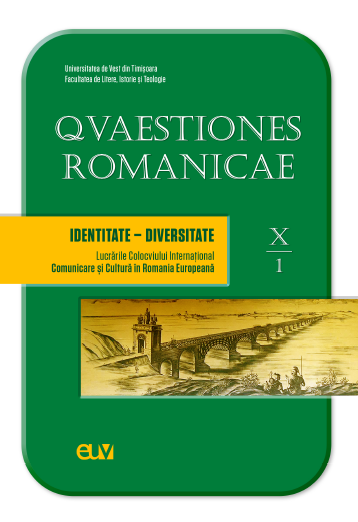Patronus et cliens: relații, influențe, beneficii în Roma antică
Abstract: (Patronus et cliens: relații, influențe, beneficii în Roma antică) As a form of organizing social relations, the institution of patronage has always been a complex socio-historical phenomenon, which has influenced public and private relations. In order to understand how the Roman aristocrats divided their social relations into categories, we will look at the context and the connotations with which the terms patronus and cliens were used. In this regard, we will describe the network of personal relations in the Roman aristocratic society in order to illustrate the political and especially the social tor in the life of the Roman aristocrats. In ancient society, personal ties between consequences. The links between the senatorial order and the equestrian order were so numerous that it cannot be doubted that the two orders were fully integrated from social and cultural point of view. In addition to the many kinship ties, there was a continuous exchange of beneficia between senators and equites, developing many amicitia and patronage relationships. The office of a patronal nature remained an important facpeople of different statuses were usually predominant, which was relevant to understanding the employer-type society. The ideology of exchanging gifts for public and private welfare in the Roman world was based on the relationship between debt, status, expense. The economic elements were embedded in non-economic institutions due to the concept of "profit" of the classical man, which was to acquire "symbolic capital" and status. We will also show that during the Republic the political effectiveness of a senator was related to the power of his clients and the power of those considered his friends. With the advent of the princeps this fact changed and the approach to the emperor became the safest and most important thing. A senator's amici and protégés could be decisive in promoting his clients.
Keywords: patronus, cliens, officium, beneficium, auctoritas.
Rezumat: Ca formă de organizare a raporturilor sociale, instituția patronatului a reprezentat întotdeauna un fenomen socio-istoric complex, care a influențat relațiile publice și private. Pentru a înțelege modul în care aristocrații romani au împărțit în categorii relațiile lor sociale, vom urmări în ce fel de context și cu ce conotații au fost folosiți termenii de patronus și cliens. În acest sens, vom descrie rețeau de relații personale din societatea aristocratică romană pentru a ilustra consecințele politice și mai ales sociale. Legăturile dintre ordinul senatorial și cel ecvestru erau atât de numeroase, încât nu poate fi pus la îndoială faptul că cele două ordine erau în întregime integrate din punct de vedere social și cultural. Pe lângă numeroasele legături de rudenie, a existat un schimb continuu de beneficia între senatori și equites, dezvoltând numeroase relații de amicitia și patronat. Officia de natură patronală au rămas un factor important în cadrul vieții pentru aristocrații romani. În societatea antică legăturile personale dintre oameni cu statut diferit erau de obicei predominante, aspect relevant pentru înțelegerea societății de tip patronal. Ideologia schimbului de daruri în cadrul binefacerilor publice și private din lumea romană s-a bazat pe relația dintre datorie, statut, cheltuială. Elementele economice erau înglobate în instituții neeconomice datorită concepției de „profit” a omului clasic, care era aceea de a dobândi „capital simbiolic” și statut. De asemenea, vom arăta că în timpul Republicii eficacitatea politică a unui senator era legată de puterea clientelei sale și de puterea celor considerați prietenii săi. Odată cu apariția princeps-ului acest fapt s-a schimbat și apropierea de împărat a devenit cel mai important și sigur lucru. Amici și protejații unui senator puteau fi hotărâtori pentru promovarea clienților săi.
Cuvinte-cheie: patronus, cliens, officium, beneficium, auctoritas.
